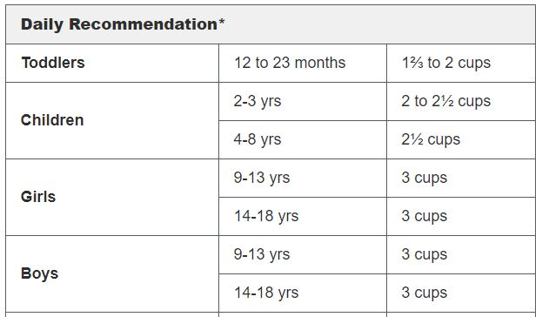The recommended amount of milk for children to drink daily is based on the child’s age. It is also important to remember that whatever beverages that are offered a child in their first 5 years of life will impact his or her lifelong taste preferences.1 So, what are the best options early in a child’s life? Water – for proper hydration, and milk – essential for growth.1
Milk is important in our diets because it provides calcium, Vitamin D, Vitamin A, and protein. It is especially important for children as these nutrients are all necessary for proper growth and bone development. The fat content in milk is necessary for brain growth and neurological development, therefore children up to 2 years of age should drink whole milk.2 Children over the age of 2, can drink 2% or low-fat (1%) milk.1
However, if a child is allergic to cow’s milk and/or a plant-based milk is preferred, then a fortified soy milk is the best option as it is the most similar in nutritional value to cow’s milk.2 Note that it is important to check the Nutrition Facts Label on different brands of soy milk and choose those with added calcium and Vitamin D, with no added sugars.3 It is a good idea for parents to consult with an allergist and/or a Registered Dietitian if an allergy is suspected to help them make the best choice for their child.
Not recommended are other plant-based milks, such as almond, coconut, hemp, rice, etc., due to the low protein and fat content. Flavored milks are also not recommended due to the added sugars and should be avoided in children under 2 years old.1 Milks labeled as ‘Toddler milk’ are also deemed unnecessary as they tend to contain added sugars as well.1 Added sugars have been known to hamper the child’s appetite and make him or her less likely to drink regular, plain milk.
General guidelines for how much milk a child each should drink are: 2 – 3 cups per day for children 12-24 months; and 2 – 2½ cups per day for children 2–5 years old.1 For children over 5 years old, the daily recommendations are 2½ cups to age 8, and then 3 cups for ages 9-18. For a MyPlate plan that includes dairy/milk recommendations specific to your child, please visit https://www.myplate.gov/myplate-plan and complete the “Get Your MyPlate Plan”.
From the MyPlate.gov website, here are General Recommendations from the Daily Dairy Table:4 Note that this table is not exclusively for milk, but includes all dairy products such as cheese, yogurt, ice cream, etc.

With the various dairy options available and by following these guidelines and recommendations, it is likely that your child is getting the calcium, protein, and vitamins that he or she needs! Just remember that under age 2, providing your child with full-fat or whole milk or fortified soy milk is very important for their brain growth. Beyond that, skim, low-fat, or plant-based milks are fine.
By Diana Groux, SHSU Dietetic Intern
References
1. Muth N. Recommended Drinks for Young Children Ages 0-5. American Academy of Pediatrics.
2. Riley L, Rupert J, Boucher O. Nutrition in Toddlers. American Family Physician. 2018;98(4):227-232.
3. Johnson A, Ansel K. Dairy Alternatives for Kids Who Won’t – or Can’t – Drink Milk. eat right Academy of Nutrition and Dietetics.
4. MyPlate.gov. What foods are included in the Dairy Group?
